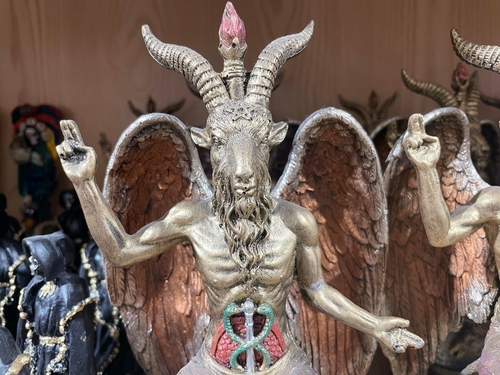Concord, New Hampshire, has stirred debate by permitting The Satanic Temple to set up a holiday display near a Christian Nativity scene at the state capitol. This move marks a significant gesture towards upholding First Amendment rights, yet it has left many questioning how the story will continue to unfold.
First Amendment Exercise
The City of Concord authorized The Satanic Temple’s display to avoid potential legal disputes. Citing First Amendment rights, city authorities deemed it essential to allow such displays to prevent lawsuits while ensuring religious diversity. The satanic display, featuring a statue of Baphomet in Catholic clerical robes with inverted crosses, a satanic version of the American flag, and the Temple’s seven tenets, stands as a critique of the adjacent Nativity scene.
Members of The Satanic Temple emphasized their efforts to advocate for empathy and counter injustice. The organization threatened legal action if denied inclusion. This has spurred controversy and led to acts of vandalism against the display soon after its installation.
Community and Political Reactions
State Representative Ellen Read supported the initiative, underscoring religious liberty by assisting with permits. In contrast, Concord Mayor Byron Champlin disapproved, labeling it a political maneuver rather than a true religious expression. Mayor Champlin’s preference to refuse the permit, despite potential legal risks, highlights the nuanced tension between free expression and perceived political statements.
In Concord, NH, the Satanic Temple has installed its own holiday monument in front of the New Hampshire State House, near the city Christmas tree and a nativity scene. The Satanic Temple threatened to sue if they weren’t allowed to hail Satan during Christmas 🤦🏻♀️ (link to article… pic.twitter.com/cbHTnygH5W
— OneOutOfFour (@OneOutof4) December 8, 2024
N.H. State Rep. Ellen Read remarked on the potential for both satanic and traditional displays to offend some observers. Meanwhile, Christian advocacy groups criticized the temple’s actions, perceiving them as attention-seeking and a challenge to Christian beliefs. The situation has prompted discussions about potential changes in Concord’s policies on public displays.
Future Implications for Public Displays
Concord plans to review its policy on unattended displays, possibly forming a committee to reassess its stance. The decision to permit The Satanic Temple’s display may influence future regulations surrounding religious expressions in public spaces. The debate continues, reflecting broader discussions about how cities maintain a balance between tradition and inclusivity in public religious displays.
“Under the First Amendment and to avoid litigation, the City needed to choose whether to ban all holiday displays installed by other groups, or otherwise, to allow it,” a post on the City of Concord’s Facebook page said.
Read the article: https://t.co/xnB7lQWomv pic.twitter.com/ntOR3iQaxb
— The Satanic Temple (@satanic_temple_) December 8, 2024
Notable figures like Lucien Greaves, The Satanic Temple spokesman, stress that respecting religious liberty requires non-interference by the government in individual beliefs. The city’s eventual decision to allow holiday displays signals a dedication to uphold the tenets of the Constitution, despite public controversy and differing opinions from both officials and residents.
Sources:
- Satanic Temple Puts Up Display Outside NH State House – The Maine Wire
- A bad night in Concord for The Satanic Temple’s effigy; mayor wants policy on public displays
- New Hampshire capital includes Satanic symbol as part of their holiday display ‘to avoid litigation’
- New Hampshire capital includes Satanic symbol as part of their holiday display ‘to avoid litigation’ | Fox News

